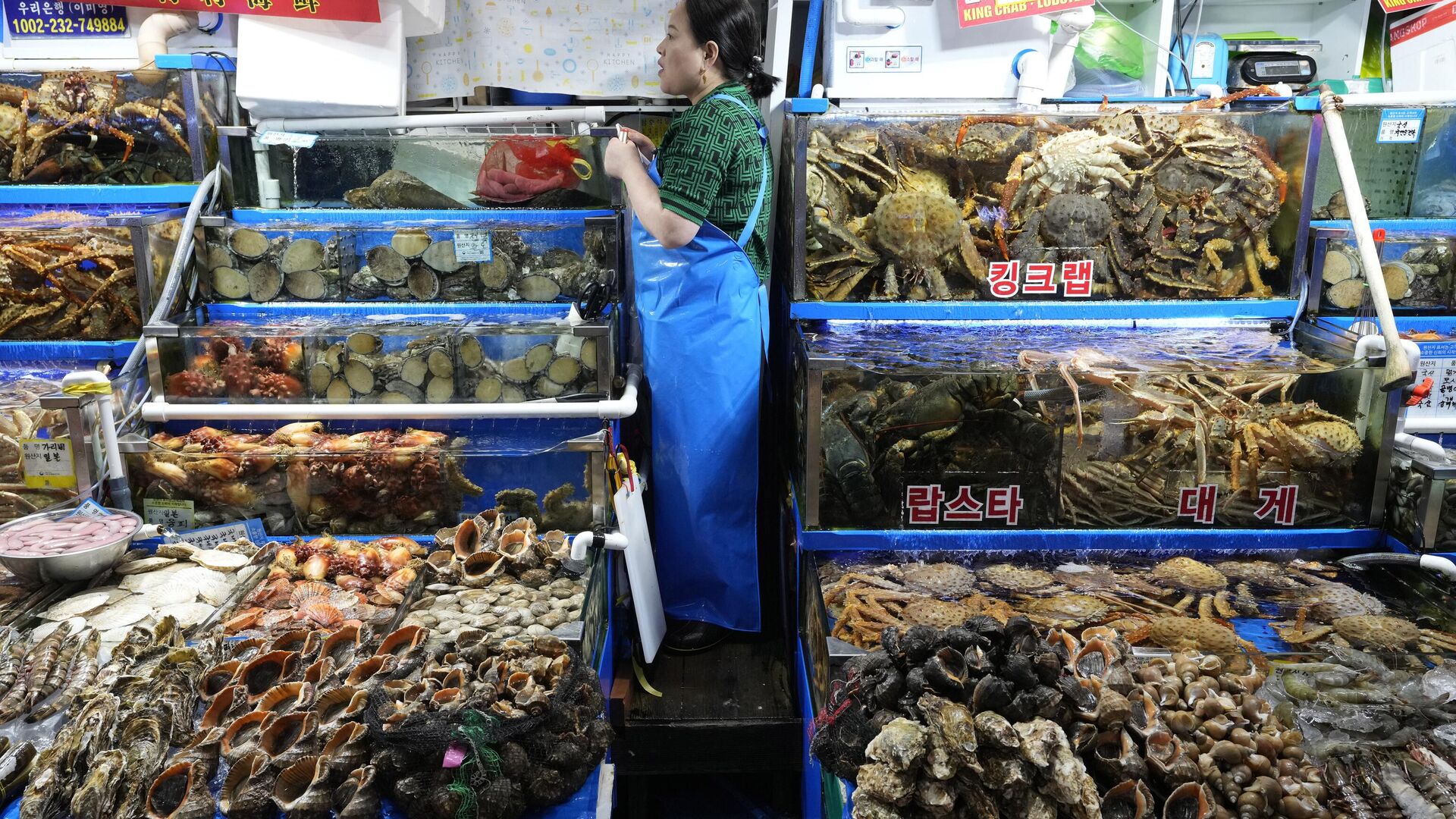https://sputnikglobe.com/20230827/thai-consumer-council-calls-for-thorough-checks-of-seafood-imported-from-japan-1112936613.html
Thai Consumer Council Calls for Thorough Checks of Seafood Imported From Japan
Thai Consumer Council Calls for Thorough Checks of Seafood Imported From Japan
Sputnik International
The Food and Drug Administration for Thailand called for thorough inspections of Japanese seafood in wake of the release of water from the Fukushima nuclear power plant.
2023-08-27T23:27+0000
2023-08-27T23:27+0000
2023-08-27T23:27+0000
asia
japan
food and drug administration (fda)
tokyo electric power company (tepco)
thailand
fukushima
https://cdn1.img.sputnikglobe.com/img/07e7/07/0a/1111780146_0:156:3088:1893_1920x0_80_0_0_b7ba4531750b413606ef6592b4564023.jpg
The seafood needs to be checked for radioactivity due to Tokyo’s decision to start the release of treated water from the Fukushima nuclear power plant (NPP), the chairman said.He also noted that China, Hong Kong and South Korea had suspended imports of all types of seafood from Japan, while no Thai agency announced any measures to reduce security risks, the report said, adding that Thailand is a major importer of fish products from Japan. At the same time, FDA deputy secretary-general Lertchai Lertvut reportedly said that consumers should not worry about their safety as the FDA, Department of Fisheries, narcotics suppression police and the Thailand Institute of Nuclear Technology are conducting regular checks of all imported seafood. On Thursday, Japan started dumping the treated water from the Fukushima NPP into the Pacific Ocean, having diluted it with sea water in advance. The NPP's operator, TEPCO, claimed to have purified the water of all radionuclides except tritium, which was still within the permitted limit. Tokyo said earlier in the year that it had to discharge the treated water as it urgently needed to free up space at the disabled NPP. The move faced criticism from a number of countries, including China, South Korea and North Korea, who fear radioactive contamination. The International Atomic Energy Agency said that Tokyo's activities were consistent with international safety standards and that the wastewater would have a negligible radiological impact on people and the environment. In March 2011, the Fukushima NPP had three of its reactors melt down after the nation was shaken by a magnitude 9 earthquake followed by a massive tsunami. Fukushima is considered the worst nuclear disaster since the Chernobyl accident in 1986.
japan
thailand
fukushima
Sputnik International
feedback@sputniknews.com
+74956456601
MIA „Rosiya Segodnya“
2023
Sputnik International
feedback@sputniknews.com
+74956456601
MIA „Rosiya Segodnya“
News
en_EN
Sputnik International
feedback@sputniknews.com
+74956456601
MIA „Rosiya Segodnya“
Sputnik International
feedback@sputniknews.com
+74956456601
MIA „Rosiya Segodnya“
fukushima water safe, radioactive fish in japan, what are the effects of fukushima, is fukushima safe now?
fukushima water safe, radioactive fish in japan, what are the effects of fukushima, is fukushima safe now?
Thai Consumer Council Calls for Thorough Checks of Seafood Imported From Japan
MOSCOW (Sputnik) - The Food and Drug Administration of Thailand (FDA) and the Department of Fisheries should take strong measures to thoroughly check all seafood imported from Japan the Chairman of Thailand Consumer Council’s sub-committee on food, drugs and health products, Panuchote Thongyang, said on Sunday.
The seafood needs to be checked for radioactivity due to Tokyo’s decision to start the release of treated water from the Fukushima nuclear power plant (NPP), the chairman said.
"I would like to call for the FDA and the Department of Fisheries to urgently take preventive measures, especially random checks of imported seafood both at checkpoints and at local markets," Thongyang was quoted as saying by the Bangkok Post newspaper.
He also noted that China, Hong Kong and South Korea had suspended imports of all types of seafood from Japan, while no Thai agency announced any measures to reduce security risks, the report said, adding that Thailand is a major importer of fish products from Japan.
At the same time, FDA deputy secretary-general Lertchai Lertvut reportedly said that consumers should not worry about their safety as the FDA, Department of Fisheries, narcotics suppression police and the Thailand Institute of Nuclear Technology are conducting regular checks of all imported seafood.
On Thursday, Japan started dumping the treated water from the Fukushima NPP into the Pacific Ocean, having diluted it with sea water in advance. The NPP's operator, TEPCO, claimed to have purified the water of all radionuclides except tritium, which was still within the permitted limit.
Tokyo said earlier in the year that it had to discharge the treated water as it urgently needed to free up space at the disabled NPP. The move faced criticism from a number of countries, including China, South Korea and North Korea, who fear radioactive contamination. The International Atomic Energy Agency said that Tokyo's activities were consistent with international safety standards and that the wastewater would have a negligible radiological impact on people and the environment.
In March 2011, the Fukushima NPP had three of its reactors melt down after the nation was shaken by a magnitude 9 earthquake followed by a massive tsunami. Fukushima is considered the worst nuclear disaster since the Chernobyl accident in 1986.




